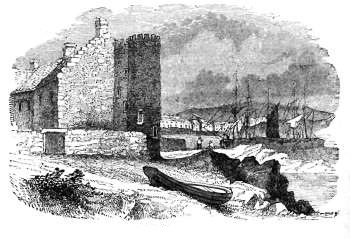St. Malachy
We have already mentioned that St. Celsus appointed St. Malachy his successor in the Archiepiscopal See of Armagh. Malachy had been educated by the Abbot Imar O'Hagan, who presided over the great schools of that city; and the account given of his early training, sufficiently manifests the ability of his gifted instructor, and the high state of intellectual culture which existed in Ireland. While still young, St. Malachy undertook the restoration of the famous Abbey of Bangor. Here he erected small oratory of wood, and joined himself to a few devoted men ardent for the perfection of a religious life. He was soon after elected Bishop of Connor. With the assistance of some of his faithful monks, he restored what war and rapine had destroyed; and was proceeding peacefully and successfully in his noble work, when he was driven from his diocese by a hostile prince. He now fled to Cormac Mac Carthy, King of Desmond;[6] but he was not permitted to remain here long. The See of Armagh was vacated by the death of St. Celsus, and Malachy was obliged to commence another arduous mission. It is said that it almost required threats of excommunication to induce him to undertake the charge. Bishop Gilbert of Limerick, the Apostolic-Delegate, and Bishop Malchus of Lismore, with other bishops and several chieftains, visited him in the monastery which he had erected at Ibrach,[7] and at last obtained compliance by promising him permission to retire when he had restored order in his new diocese.

Bangor Castle
St. Malachy found his mission as painful as he had anticipated. The lay intruders were making a last attempt to keep up their evil custom; and, after the death of the usurper who made this false claim, another person attempted to continue it; but popular feeling was so strong against the wretched man, that he was obliged to fly. Ecclesiastical discipline was soon restored; and after Malachy had made a partition of the diocese, he was permitted to resign in favour of Gelasius, then Abbot of the great Columbian Monastery of Derry.
Notes
[6] Desmond.—See the commencement of this chapter, for an illustration of the ruins of its ancient rath and the more modern castle. These remains are among the most interesting in Ireland.
[7] Ibrach.—Supposed to be Ivragh, in Kerry, which was part of Cormac Mac Carthy's kingdom.
